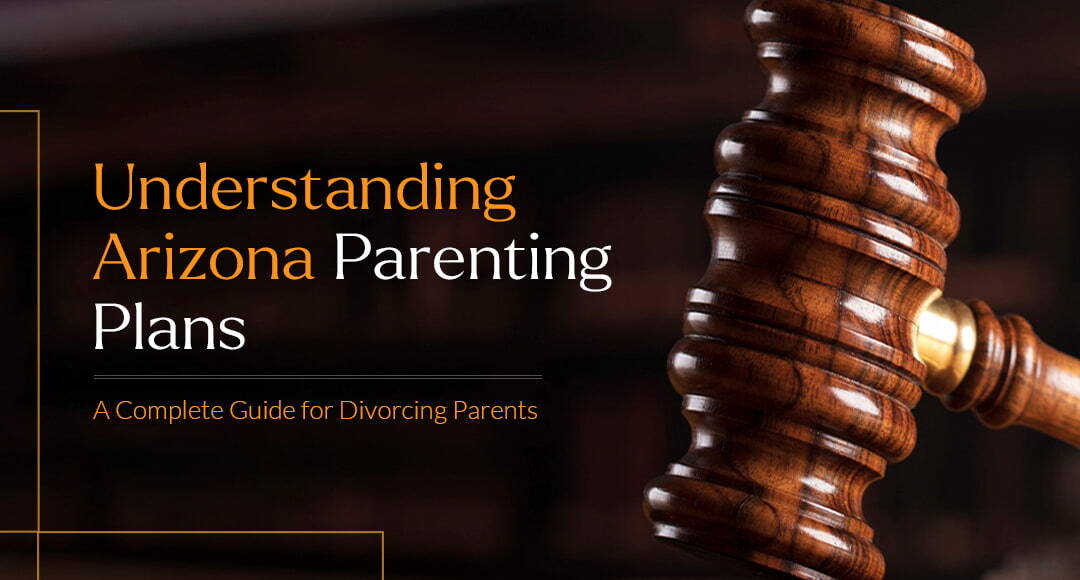
by gary | Jul 16, 2025 | Blog
Several questions usually arise during divorce proceedings. Parental visitation is often one of the most discussed issues, with a focus on how each parent should be involved with the child’s life. While Arizona law is clear on how to approach this issue, understanding what to expect can help you plan better. This article provides a simplified guide for divorcing parents on how to approach the issue of parenting time.
What is Parenting Time in Arizona
Parenting time in Arizona is a term used to refer to what other jurisdictions call physical custody. It is a key component of child custody, defining how each parent spends time with the child. As per the guidelines, a parenting plan in Arizona is established by court order. Even in situations where the parents have agreed to informally create a parenting schedule, they must submit and formalize the agreement in the family court for it to be adopted as an enforceable court order.
These Arizona parenting time guidelines means that neither paret is entitled to parenting time without a court order. While the framework is clearly set out, it often leads to one parent withholding or keeping the child from the other parent. In most cases, the scenario disproportioaly affectes unmarried fathers as the mother remains the legal custodian of the child until paternity is established and custody determined by a court.
How to Establish Parenting Time in Arizona
Parental visitation time is one of the most contested issues for divorcing parents. However, the process of establishing child visitation time starts with one or both parents filing a petition to “Establish Parenting Time.” In cases where paternity has not been established yet, it can be done at the same time. This also includes legal decision-making and child support.
If the two of you have already agreed on parental visitation and everything else, you can submit a parenting plan jointly. Without an agreement, however, either parent can file a Petition to Establish. In situations where a parent needs immediate parenting time orders, this can be achieved by filing a motion for temporary orders with the petition or after it has been filed.
Once you file the petition, it is served on the other parent. This means that the petition is delivered to the other parent by a process server or other means provided by the Arizona Rules of Family Law Procedure. The other parent will be given 20 or 30 days to file a response.
How Do the Courts Decide Parenting Time in Arizona?
When parents cannot agree to a parenting time schedule, the family court will decide the parenting time for each parent. This is determine after an evidentiary hearing or trial that allows every parent to present evidence and testimony to support their preferred parenting time schedule. Arizona law provides family court judges with broad discretion in determining parenting time. However, they are guided by several factors.
The most important factor under consideration is the best interests of the child. Every case in Arizona that involves parenting time or decision-making is based on the best interests factors. These include the relationship between parent and child, the child’s adjustment to home and community, their age and maturity, presence of domestic violence, whether a parent intentionally misled the court to cause delay, and other relevant factors.
What is the Role of Court Appointees
Family courts use other resources to determine parenting time, including professionals who can be appointed to help. This is usually done in special cases, such as when neglect or child abuse is alleged. In such cases, court-appointed advisors (CAA) or best interests attorneys (BIA) are consulted to help determine child visitation time.
Best interest attorneys do not testify as they are not witnesses and cannot submit their opinions as evidence. Instead, they participate in the case like attorneys for the parents, but advocating for the best interests of the child. On the other hand, court-appointed advisors may interview the parents, children, and other witnesses. Based on the interviews, they prepare a report containing their recommendations for parenting time or legal decision-making.
Hire a Child Visitation Attorney
Although Arizona law provides clear guidelines for establishing Arizona parenting plans, most parents struggle to come to an agreement. Even with an agreed plan, you still need to formalize it and get a court order to actually implement the visitation schedule. A child visitation attorney guides you through this process, ensuring you settle any issues in the best interests of the child. Contact Schill Law Group today to work with an experienced and reliable child visitation attorney.

by gary | Jul 5, 2025 | Blog
When a custodial parent is under a court order and is planning to relocate with the child, he or she is required to first obtain the court’s permission. The law provides a specific distance that the parent can relocate to and what they need to do before moving out of state with the child. In this article, we briefly explain how far a parent can move with joint custody in Arizona and what you need to know legally.
What Should a Custodial Parent Do Before Relocating?
If you are a custodial parent under a court order planning to move out of state with the child, you must first obtain the court’s permission. The law requires you to provide the other parent with a notice in writing that is sent via certified letter at least 45 days before moving. Failure to notify the court of your planned move can result in serious legal ramifications.
The family court judge is guided by the best interests of the child in all Arizona custody matters. When the primary residential parents decide to move away from the state, the remaining parent is entitled to a 45-days’ notice before the child can be relocated out of state. If the remaining parent objects the move, then the court will review the effect that the relocation could have on the child. However, they are required to provide a timely response: they have 30 days to file a petition preventing the relocation.
How Far Can a Parent Move with Joint Custody in Arizona?
Custodial parents are required to notify the court of any proposed move out of Arizona or over 100 miles within the state. Further, the parent cannot simply decide unilaterally to move away without giving a legal notice. Under the custody laws, the child remains under the jurisdiction of the Arizona courts until emancipation (or above the age of 18 years).
How Arizona Child Relocation Laws Apply
Under the Arizona child relocation laws, the controlling Arizona statutes apply when both parents are entitled to custody, parenting time, or reside in the state by agreement or court order. In the case of relocation, the judge will examine the proposed move and the impact it will have on the child. Some of the factors the judge looks at include:
- The circumstances or reasons behind the custodial parent relocating
- The impact of the move on the noncustodial parent’s visitation
- Whether the move was motivated by a desire to gain an advantage over child support or in bad faith
- Whether the move is motivated by a desire to keep the child away from the noncustodial parent
- The effect of the move on the physical and mental well-being of the child
How to Address the Relocation with the Noncustodial Parent
Moving out of state will undoubtedly affect the noncustodial parent’s right to access the child. The parents can work together toward a modified parent time agreement that meets the primary objective of each while protecting their relationship with the child. Usually, longer but less frequent visits become the obvious solution.
Following the move, the parents must make a few adjustments to child support, travel, and lodging costs. This also includes the extra expenses that the noncustodial parent will incur due to the increased distance from the child. If the parents do not have an agreement in place, the court will decide the terms. Usually, an Arizona judge will use the Arizona child custody laws when moving out of state to give an order that includes modifications to parenting time to ensure the rights of both parties are protected, with the child’s best interest being given the utmost priority.
Can I move out of Arizona without asking the court if I have sole custody?
No, you cannot move out of state without asking the court, even if you have sole custody. Legal decision-making in Arizona is separate from physical custody. Thus, the parent is required to first notify the other parent of their intent to relocate, allowing the noncustodial parent to respond by either accepting or filing an objection with the court.
Can the noncustodial parent move out of state without notice?
Yes, a noncustodial parent can move out of Arizona without notice. The legal requirement to provide written notice before relocating applies to moving with children. The noncustodial parent can move without notice since they will not be moving with the child. However, if you still want to visit the child, you must tell the other parent that you have moved and where you have moved to.
Get in Touch with a Custody Attorney
A custodial parent in Arizona who wishes to move with their child out of state or more than 100 miles away within the state is required to provide a written notice to the other parent. If you are planning to relocate with your child or stop a relocation, talk to our lawyers at Schill Law Group. We will help understand the provisions of the law and navigate such processes.

by gary | Jul 5, 2025 | Blog
The process of filing for a divorce can be overwhelming, especially with the emotional toll that comes with ending a marriage. Although no one enters a marriage with divorce in mind, sometimes it’s the only option. The legal process itself can be complex, with practical decisions to make, requirements to meet, and forms to sign. In this article, we break down the process of filing for divorce in Arizona so you can know what to expect and prepare accordingly.
How Divorce Is Different in the State of Arizona
Filing for a divorce in Arizona refers to the process of divorce as the dissolution of marriage. However, it differs slightly from some states in terms of requirements. For instance, the Judicial Branch of Arizona requires residents to wait for at least 60 days from the date of their marriage before they can file for a divorce.
The parties pursuing the dissolution of their marriage must be domiciled in the state for at least 90 days before filing. This means that the couple must have treated Arizona as their primary state of residence. One of the ways you can demonstrate that your primary domicile is by registering to vote. If you and your spouse meet these two requirements, either can push to proceed with the marriage dissolution.
What Do You Need to Discuss With Your Spouse Before Divorce Proceedings?
Before filing for a divorce, it helps to discuss pertinent issues with your spouse or partner. Agreeing on the following issues can speed up the process and make the divorce proceedings seamless:
Custody of the Minor Children
Custody is one of the primary concerns for many parents when filing for a divorce. When minor children are involved, the court will have to decide about the custody. Being on good terms with your partner can be helpful. You can discuss the future of your children and decide on the best course of action:
- How you will divide parenting time: Do you want to have rotating schedules, or split the weekends and weekdays?
- How will you make decisions about your children: Will the parent who is currently watching over the child have the right to make all decisions, or will consultations be necessary?
Discussing the issues of custody ensures that both of you are content with the arrangement and that the young children involved will not be subjected to conflict needlessly. If you cannot agree about the custody, then the judge will do it for you.
Child Support
Child support refers to the financial obligations that parents have to their children. Whether you are the parent awarded primary custody or the non-custodial, supporting your child will still be your responsibility. Although there is no set amount of child support you must pay, the law requires it to be a reasonable amount.
Maintenance or Alimony
Alimony means maintaining a certain standard of living for your ex-partner. This provision during a divorce covers the unequal division of assets. It can take different forms other than monetary payments, such as providing your partner with certain goods and/or services in lieu of financial support.
Division of Assets
Another thing you will need to discuss before divorce proceedings is asset division. The court will usually seek to equally divide all the assets that the couple acquired throughout the marriage. Talking about the division of assets with your spouse helps to clarify which of your assets were obtained before getting married, and avoid contentious dissolution.
How to File for a Divorce in Arizona: A Step-by-Step Guide
Whether you have discussed the above with your or not, you can still start the divorce proceedings. Here are the key steps to follow:
Step 1: Obtain and Accomplish the Petition for Dissolution of Marriage
The first step to filing a divorce in Arizona is to obtain a petition for dissolution of marriage. This is the document that the court will repeatedly reference throughout the divorce proceedings. Make sure you provide all the requested details and fill out the form under the supervision of an attorney to avoid making mistakes.
Step 2: Complete Other Relevant Documents
In addition to the petition for dissolution of marriage, you may be required to fill out the preliminary injunction, summons, sensitive datasheet, and other documents.
Step 3: File the Petition for Dissolution of Marriage and Other Documents with the Court
Once you have obtained and filled the necessary documents, head over to the courthouse in your area and look for the clerk of court who will accept your filing. Familiarize yourself with the rules for filing and pay the necessary fee. You will then be given a case number that you will use as a reference for future proceedings.
Step 4: Serve the Petition for Dissolution of Marriage and Other Documents to the Other Party
With the documents completed and filed, you can now serve your spouse the petition to dissolve the marriage. Serving them the paperwork gives them a legal notice of what you intend to do.
You can serve your spouse divorce documents by sending an unrelated party such as a registered process server or a law enforcement officer to deliver the documents. You could also have them sign an Acceptance of Service before serving the documents. You are then required to return the signed documents to the clerk of court and file the proof of service.
Step 5: Wait for the Response of the Other Party
If your spouse lives in Arizona, they will have up to 20 days to file a response to your petition while those living outside will have up to 30 days. In cases where the respondent was made aware of the petition through a publication, they will have up to 60 days from the day of the notice’s initial publication to respond. If the other party does not respond on time, the case can proceed by default if they fail to respond promptly.
Step 6: File a Consent Decree if You Agree to the Dissolution of Their Marriage
Once the two of you agree to the terms of the divorce and indicate as such in their response, the next step is to file consent decrees, detailing the terms of your divorce. The consent decrees are then filed with the court. You may need to make an additional appearance in court to finalize the divorce.
Step 6A: Attend a Default Hearing
If your ex-partner does not respond to the petition, a default hearing will eventually end in your being divorced. You will need to file an application and affidavit of the default divorce and send a copy to your spouse. If they do not respond after 10 days, your divorce will push through.
Step 6B: Go to an Early Resolution Management Conference
The court may order both of you to attend an Early Resolution Management Conference if your ex-spouse does respond and indicate that they do not agree with the terms of marriage dissolution. During the conference, the two will need to compromise and agree to the terms of your divorce.
Step 6C: Take Part in a Trial
In cases where the two of you cannot agree to the terms, the trial may go to court. Since trials can be costly and time-consuming, it is best to discuss all the pertinent issues with your partner before starting the divorce proceedings.
Step 7: The Dissolution of Marriage Is Finalized
Your marriage is dissolved at the end of the divorce, whether you went through a relatively civil divorce or a contentious trial. The court will hand down the decree of dissolution of marriage, marking the finalization of the divorce.
Hire a Reliable Divorce Lawyer
Divorces can be messy, tiring, and costly. However, working with an experienced lawyer increases the chances of getting final terms that favor you. If you want to file for a divorce in Arizona, contact us at the Schill Law Group today. Our attorneys are ready to take your case and guide you through every step of divorce proceedings.

by gary | May 13, 2025 | Blog, DUI
When you are arrested for drinking under the influence (DUI) in Arizona, your license will be immediately suspended. A DUI arrest is considered a serious offense and will have immediate consequences even if you have not been convicted of the crime. However, you may get a restricted license, allowing you to drive to work or school. To give you a better understanding of how this works, this article explains what happens to your license after a DUI in Arizona.
Will I Lose My License for A DUI?
Yes, you may lose your license for a DUI charge. If you are arrested for DUI in Arizona, your license will be taken under the following circumstances:
- BAC test results are unavailable
- BAC results of 0.08 or higher
- BAC results are 0.04 or more while driving a commercial vehicle
- A drug is found in your system
Once charged with a DUI, the officer will take your license. They will then issue you an admin per se form, which will serve as your driver’s license for the next 15 days. Under the admin per se law, the state has the authority to suspend your license upon an arrest for a DUI.
The initial suspension of your license from the Motor Vehicle Department (MVD), even before you get to the court. This means that your license will be suspended even if you have not been convicted of a DUI. However, if you end up being convicted of a DUI, then the court may suspend your license.
Is Your License Suspended Immediately After A DUI?
If you are arrested for a DUI in Arizona, your license is not suspended immediately. Instead, you are given a 15-day grace period during which you will still be allowed to drive. However, you are required to request a hearing with the MVD during the 15-day grace period or give up your right to do so. If you do nothing during this period, then the suspension will automatically go into effect.
How Do You Request a Hearing with the MVD?
To stop the automatic suspension of your license, you must request a hearing with the MVD. A written request is needed to request the hearing, which can be submitted via email, mail, or fax. The request will aid in stopping the suspension from going into effect until your court hearing. The three main types of MVD hearings that you may request include
- Administrative Per Se: Hearing of the issues surrounding the charge to make sure that the police had reasonable suspicion that you were impaired.
- Implied Consent: Hearing requested if you refused to provide a breath or blood sample voluntarily after you were stopped.
- Negligent Operator: A Hearing that examines the entire points record.
How Long Is Your License Suspended for A DUI in Arizona?
The period of time your license is suspended for a DUI in Arizona will depend on the type of hearing you get. The MVD hearing involves an Administrative Law Judge who listens to the arresting officer’s testimony and then decides the issue based on the stands of “beyond a reasonable doubt”. The hearing is less formal and there will be no jury, with the burden of the hearing being a preponderance of the evidence, which means the decision is made based on the notion of “more likely than not.”
If the judge upholds the license suspension, your suspension will start within 30 days. In the case of an admin per se hearing, the license will be suspended for 90 days. However, for an implied consent hearing, the suspension will last for 12 months.
For an admin per se suspension, you may still regain some driving privileges after 30 days. This happens if you complete the alcohol screening form from an approved agency. In contrast, you become eligible for restricted driving after 90 days in the case of an implied consent hearing suspension. You will also be required to pay for an ignition interlock device to be installed and maintained on your vehicle.
How a DUI Defense Lawyer Can Help
If you have been arrested or a loved one is facing DUI charges, you need to speak with an experienced DUI defense lawyer as soon as possible. The attorney will guide you through the process, ensuring you get the best possible outcome. At Schill Group, we represent clients throughout Arizona, making it easier for you to navigate the legal landscape. Get in touch with our attorneys today to get the support you need to navigate DUI charges in Arizona.

by gary | May 12, 2025 | Alimony, Blog
Going through a divorce can be a stressful experience. The financial difficulties that come with the divorce, especially if you rely on your spouse’s income for support, can be overwhelming. Understanding Arizona alimony laws can help you know what to expect and plan accordingly. Here is what you need to know about Alimony laws in Arizona and how you can qualify for spousal maintenance during and after the divorce.
How Does Alimony Work in Arizona?
Arizona alimony laws define how a spouse supports the other financially during and after a divorce. This is mostly because the spouse requesting financial support lacks the income or property to support their financial needs. The court may also consider the potential for self-sufficiency for the requesting spouse through employment. However, just because you earn less than your spouse, it does not guarantee that you will get alimony. The law has set out rules for who and when a spouse may get spousal maintenance, including the amount of payments to be made and how long they will last.
Alimony, also known as spousal maintenance or spousal support in Arizona, is an award that one spouse pays to the other after a divorce as a form of financial support. The court will usually look at several factors to determine how much support the spouse will be awarded. These may include the contributions of one spouse to the earnings of the other or the ability of each spouse to provide for the future of the children.
The spousal maintenance guidelines in Arizona ensure that settlements are made and that the awards are fairly predictable and consistent. These guidelines apply as long as you or your spouse has filed for a divorce or legal separation after September 24, 2022. Let’s have a look at these requirements to qualify for alimony.
How Do You Qualify for Alimony?
Alimony in Arizona is particularly useful to individuals who rely on their spouse’s income. The divorce courts can require your spouse to pay you alimony, or spousal maintenance, if you establish eligibility. However, spouses capable of living on their own without financial support usually do not need alimony. To qualify for alimony in Arizona, you need to prove the following:
- Your property is insufficient after marital distribution to support yourself.
- You helped increase the earning capacity of your spouse by contributing to the cost of their education, training, or vocational skills.
- You cannot obtain self-sufficient employment for reasons such as being too long out of the job market or the need to care for a young child.
- Your income or career opportunities have decreased significantly to benefit your spouse.
If your divorce case also includes your spouse seeking to charge you for alimony, you also need to demonstrate their lack of need and your inability to pay. The one with more evidence or convincing reasons is more likely to win. No matter which side you are on, our alimony attorneys in Arizona will present the strongest evidence to get the most favorable outcome.
How Much Alimony Can I Expect to Get?
The amount of alimony you can get in Arizona is not fixed. This will usually depend on several factors related to the spouses and the conditions of the case. Once you qualify for alimony or spousal maintenance in Arizona, you will receive payments based on your earning potential and how you lived as a married couple. Other factors that the court considers include:
- Factors similar to those used in deciding if you qualify
- Your marital standard of living
- Your spouse’s ability to afford to pay alimony
- Age, health, earning capacity, or financial resources of you and your spouse
- The marriage’s duration
- Bad faith and criminal conduct for you or your spouse
When faced with such a case, you need an experienced alimony lawyer who can negotiate an agreement on the amount with your spouse. If no agreement is reached, the lawyer will guide you on seeking the spousal maintenance you deserve.
Consult with Arizona Alimony Lawyers
Every divorce case is different, and the approach used in deciding alimony may vary. If you need alimony to maintain the living standards that you were already accustomed to, speak with an experienced alimony attorney. The lawyer will ensure that your needs are well represented and increase the chances for favorable outcomes. If you are looking for reliable advice and representation, get in touch with our lawyers at Schill Law Group.






